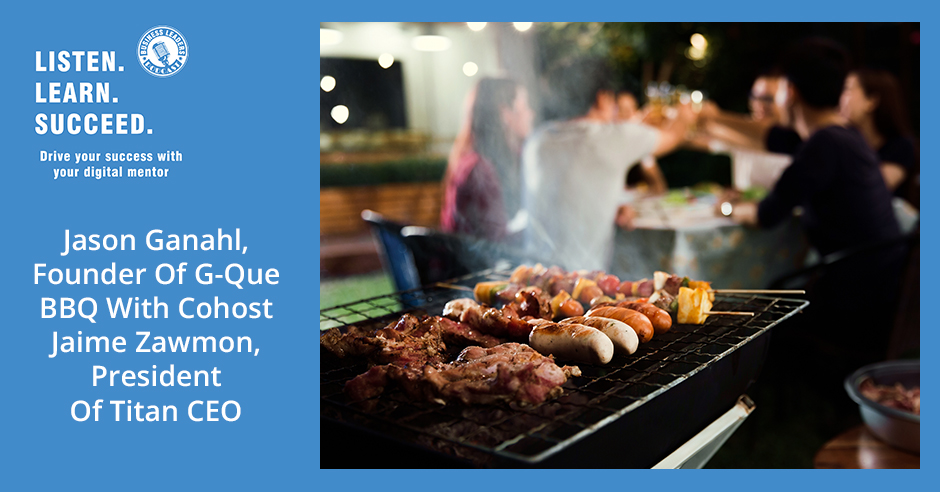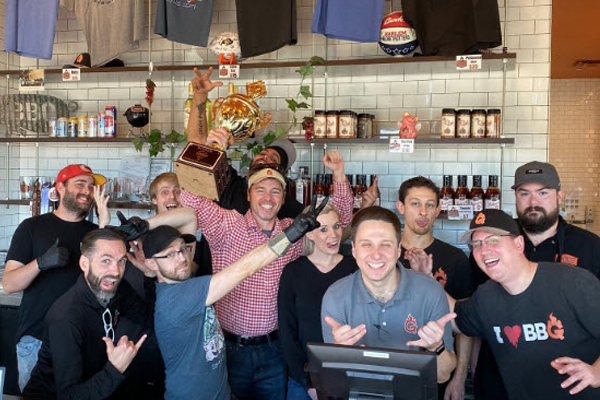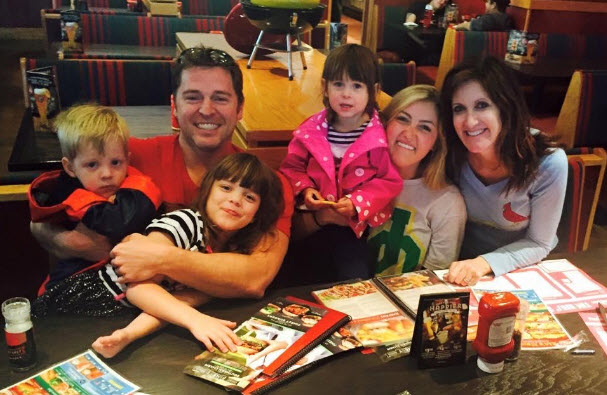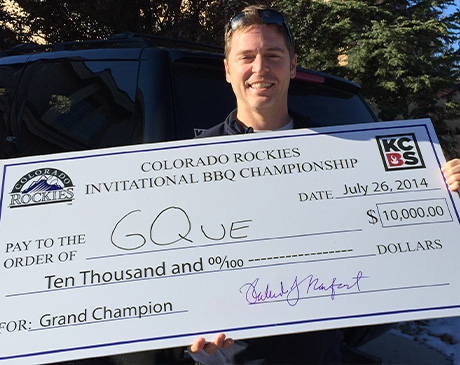Jason Ganahl, Founder Of G-Que BBQ With Cohost Jaime Zawmon, President Of Titan CEO

Honing your skills in a certain craft is best done through first-hand experience. In the case of Jason Ganahl, he was able to start his own barbeque restaurant by spending time as a judge and competitor in the biggest professional barbeque contests. Jason sits down with Bob Roark, joined by his cohost Jaime Zawmon, to share how he founded G-Que BBQ and his strategies in maintaining its success, particularly in keeping good connections with customers even beyond good food. He also shares how his business dealt with the changes caused by the pandemic and how he plans to address any future adjustments that may come.
—
Watch the podcast here:
Jason Ganahl, Founder Of G-Que BBQ With Cohost Jaime Zawmon, President Of Titan CEO
We are joined by Jaime Zawmon, my cohost, President and Founder of Titan CEO. We also have Jason Ganahl, the Founder of GQue BBQ and the Maestro of Meat.
Good day, Jaime and Bob.
Tell us about GQue BBQ. Tell us about your business and who you serve.
In GQue, we got several different taglines. One of them is “Colorado’s Only Championship Barbecue Restaurant.” I started out as somebody who wanted to eat good barbecue and then I became a judge for a professional barbecue contest. I started competing in a professional barbecue contest and opened up a barbecue restaurant. We are the only barbecue restaurant in Colorado that won a professional barbecue contest.
How does one get to be a judge? I’m thinking that’s clever.
It’s great but you pack on the pounds being a judge. You eat pounds of food at a barbecue contest, which is great, I loved it. I was a judge many years ago. We have a lot of judges that are 65 or 70 years old. I can’t imagine how they feel for 2 or 3 days after they judge a barbecue contest. Even now, if I eat a big barbecue meal, which is nowhere near the amount of meat that you would eat while you were judging a contest, I still feel it the next day. I’ll get the barbecue burst the day after at lunch or whatever. I’d burp up smoke and a little bit of the meat. I can’t imagine what it is like for some of these judges. These judges will do it every single week too for 35, 40 weeks out of the year.
I think about the travel and the schedule. For you, how did you take and apply what you learned from judging to start to influence what you were offering in your restaurant?
I tell people all the time, judging lent itself to a lot of the success I had when I was competing. When you’re competing, you’re trying to impress just the judges and being a judge for 2.5 to 3 years, I got to learn the entries of how they were presented. I got to see how they tasted but more importantly, I got to think like a judge. There are different strategies involved when you turn food in July at a contest when it’s 100 degrees outside. If you’re in a humid area, not in Colorado because we don’t have a lot of humidity, but you’re going to have a different type of flavor profile. If it’s fall, in October or September, judges prefer different types of food given the different environments, climates and places of the country you’re in.
When creating a restaurant menu, include food that will not offend any particular person. Click To TweetIt’s also important to think like a judge when you’re turning in your barbecue at these contests. I think judges helped me in that regard, more than any other regard. I don’t know if it helped out a whole lot. I guess it did when I created the menu for the restaurant, but more so, what helped me with the background in that when I created the menu for the restaurant was getting the feedback from the judges. I judged for about three years and then I competed for about five but then getting all the feedback from the judges for those five years, that gave me a good idea of what people liked. I don’t want to dominate the conversation of what judges or people like but if you look at all the different senses, you’ve got salty, savory and sweet, the good target for a lot to chefs and not so much food competitors but it’s important for food competitors too.
You don’t want to be too offensive in any one particular thing. If you’re developing a strategy for winning a barbecue contest, you want to be considered very good across the board. Maybe that judge that prefers something that’s overly sweet isn’t going to think you’re great but it’s not going to be offensive to that person. They’re going to still say, “That’s good.” If you went down that sweet path and turned in something super sweet, the judge that likes sweet is going to be like, “This is the best ribs I ever had.” However, the contrarian to that is the judge that prefers something savory is going to be like, “That’s too sweet. Get it out of here. One bite is plenty for me.” You’re hitting the fairway. You’re being good to everybody getting something with a lot of balance with something unique to it but it’s not going to be offensive to anybody. That is a good strategy for anybody out there creating a restaurant menu is to create food that’s not going to offend any particular person.
That is an interesting thought process spoken like a true Maestro of Meat. I have to ask you then, with the creativity of the name and the title, where did that come from?
I don’t know where Maestro of Meat came from. In the barbecue world, there are all kinds of silly monikers and names. I always thought Sultan was a cool name, and I had not seen anybody use Sultan of Swine. It’s important not to copy somebody else. I remember coming up with Sultan of Swine first and seeing nobody used Sultan as a moniker. Somebody said, “Maestro of Meat,” one day. I’m like, “That’s cool.” I had not thought of anybody using that. I took that on also too. It’s important for me not to do what somebody else is doing and do something unique.
I have to ask, Jason, and for those of you that are reading, Jason is recognized as one of our 2020 Titan 100, which recognizes Colorado’s Top 100 CEOs and C-Level Executives. Jason was profiled in the book, which I have a copy of. I asked every single one of the Titans that come on to this show, in their opinion, what it takes characteristics to define a Titan in their own right? What do you believe?
That’s a subjective question. I don’t know what the definition of a Titan would be but to me, when I think of a Titan, I think of an imposing character, somebody that can yield an influence, somebody that can yield a force. Somebody that can be bestowed their expertise upon a lot of different people. I think of that when I think of a Titan. However, to become a Titan is something different. I already know some of the people that also were in your group of 100. Everything that those people have that I know is passion, they might not necessarily be the smartest. They might not necessarily know the most but they’re all passionate about what they do. In order for somebody to become a Titan, and I’ve got four kids and even one of my kids to be a Titan on the baseball field, they better be excited and passionate about being out there or they’re never going to be somebody that can yield their influence over their other teammates on the baseball field.
The description if you google a Titan, it comes from Greek mythology in which Titans were a race of god. By definition, it is a person of exceptional importance and reputation. They are people who are distinguished and reputable. I would agree wholeheartedly they exude incredible passion.

I’m thinking Maestro of Meats, Sultan of Swine and Titan of Taste. I was thinking about you did something before barbecue. There’s the thought, “I love this enough, I want to pursue this in a restaurant.” You then went from the restaurant to more than one location. If you would walk us down the path from pre-restaurant to what you’re doing now. How did you get from there to here?
I had a recruiting business. I worked for formerly Medtronic. It was Covidien, it was Tyco Healthcare. They’ve had a bunch of different spin-offs and mergers and acquisitions. The company I worked for was Nellcor Puritan Bennett, which was acquired by then Mallinckrodt, which was then acquired by Tyco. I started out as a sales rep for them and I had a variety of sales and marketing management positions with them and got moved around all over the country, which was great. I was going to get moved again to take on a different role and I had met my wife. This was years ago. I was probably about 30 or 29. I thought at some point, I wanted to get married and have kids.
I can’t keep bouncing around the place, I guess I could but that’s not what I wanted to do, so I didn’t take that next promotion. I decided to go off. I developed a lot of great relationships in the medical device community. I started a recruiting firm for pharmaceutical and medical device people. I recruited sales and marketing people for that industry. I did that during the week. On the weekends, I had nothing to do. I didn’t have kids. I moved out here to Boulder. At that time, it was Covidien and our office was in Gunbarrel and I lived in Boulder. I’m not a barbecue snob. As long as it’s not over the sauce, I enjoy it.
I’ve always found barbecue that I like in the different cities that I lived in. When I moved out here, I couldn’t necessarily find the place that would warrant a 45-minute drive over and over again. I would drive to it and it would be great the first time, I would go back a second time and I would miss the mark. I then go to the next place and it is the same thing. I would find a good barbecue but it was inconsistent. I went online to try to continue to find these places all out here in the Denver area. I found this group called the Kansas City Barbecue Society. I thought that it was interesting. I learned more about it and they put on these professional barbecue contests all over the country. I was like, “Professional barbecue contest.” I’m naturally a competitive guy, so it had my interest.
I found that they had one in Frisco, Colorado and it was coming up. I marked it on my calendar and I went up there. I was immediately intoxicated by the aromas of smoke in the air. Everybody was walking around with the cold beer, music playing in the background and the atmosphere of Frisco, Colorado. I was like, “These are my kind of people right here.” I learned more about them. I have a couple of vivid memories from that day even years ago. One, I learned about the judging process that takes place and what it takes to become a judge. Two, I remember this one team, I went over to him and he was serving ribs. He’s like, “Would you like to try our rib? This isn’t what I’m selling everybody. This is one that I turned in at a contest.”
We talked earlier about the description of a Titan. I tried this guy’s food but I saw this giant logo in the back of them. He was a confident man. He had music in the background. He was drinking a beer and he’s like “Here, try my rib.” He was excited for me to try his rib. I took a bite of it out. I was like, “That’s the best rib I’ve ever had in my life,” hands down, bar none. I then looked at the results. The results came out and he was third from last in ribs. At that moment, I was intimidated thinking, “These may be my people but I don’t stand a chance like cooking food and competing on the level that these people are competing at.” That was my first foray into it. That led me because of my inability to compete at that level. I thought, “I’ve got to learn more about this. I’ve got to figure out how to eat more food like this because it tasted good.” I became a judge and I started judging a barbecue contest. I judged for 2 or 3 years before I started competing.
The thing that strikes me about that is field research. I think about how many people build a business first off by judging whatever the business does, and then spending X number of years competing to take and learn the ins and outs of what’s going on. I think it’s remarkable that the field research led you to where you are now. For the people that are reading, there are tons of lessons in doing your homework to understand your market. That’s impressive.
There are tons of lessons in doing your homework in understanding your market. Click To TweetI’ll piggyback that. I’ll give you a real-life example now in the COVID world. I remember when we opened our first restaurant up and we had the five-year anniversary back in November 2020. That’s up in Westminster. For people that are familiar with the Denver area, it’s 120th & Sheridan, and there’s Chipotle and Einstein Bros. Bagels. There’s a bunch of restaurants around that area. We figured out, “I had to make or sell this much barbecue in order to make this much money to pay back everything you need to pay back and to make it all worthwhile.” I remember for two weeks going around and sitting in these different places at lunchtime, counting the number of people coming through and then making an estimate, “These are the number of people that go to this place. These are the number of people that go to that place. How many do we think we can get to our place?”
We’re looking to do our third location, and with COVID being the way COVID is, I can’t do that now. It’s difficult for me to do the “field research” to get a good idea of what we can draw based on what the neighboring places draw. They are calling cops. You can get cops the amount that the places are selling. A perfect example is one of the places we’re looking at, the place right next to it is Bar Louie. I don’t know how much of it is alcohol or food. I do know how many people walk in the door and what the average person can spend, I can count that. That equates better for me as a number that I can handle more like, “At lunchtime, I know I can get 75 people in here. They’re going to spend this amount.” That helps me much more than knowing, “This restaurant does $3 million or whatever in sales.” It’s not as good of comparison for me.
I love that you’ve done research and it’s such a good application here. Your business in particular is definitely impacted by COVID. How have you guys continued to navigate the landscape? What are you doing and how are you continuing to navigate things?
The biggest thing I’ve noticed is drive-thrus. Places with drive-thrus are killing it. I had to go run an errand at 8:30 on a Sunday night, and there’s a Freddy’s and a Taco Bell right in the corner. The Freddy’s had about twelve deep and the Taco Bell had about eight deep. Drive-thru restaurants are doing fantastic now. People that don’t have drive-thrus, the people have to get out of their car, they have to go inside, touching more things. They’re exposed to more people. Those are the places that are having a hard time. We’ve always been lucky and that barbecue is something that holds well. I don’t know the number on this but it is probably the most consumed niche type of food off-premise.
More people consume barbecue at their workplace at home. They get it to go, they do caterings and it’s not consumed in an actual restaurant. We already read a little bit of an advantage in regards to that. We already had a third-party delivery set up. We had three different companies: DoorDash, Grubhub and Uber. We’ve since added Postmates to that. A lot of this consumption of food when it’s off-premise, so much of it comes down to the packaging. Is it going to hold the food well? Is it going to prevent the food from slipping around in the bags? Are the people going to get it the way they would expect it? Meaning, is it not in one bag? Is it not in another one? It’s because much of our food is consumed offsite already, we were already set up to excel in an environment like this.
We needed to figure out then how we can get more people to come to our place. We weren’t scrambling to set up third-party deliveries. We weren’t scrambling to set up good packaging. We offered an incentive to order online. They wouldn’t have to talk to anybody, they wouldn’t have to do anything. They could come in, grab their food and then out they go. It was a bit of an adjustment to get people aware that, “We’re offering a discount to come in and eat our food.” It’s 100% survival. We’re not making any significant money at all in 2020. It’s like, “Let’s keep everybody employed. Let’s keep our lights on. Let’s talk this year up to the year 2020 but let’s not lose anything. Let’s not go backward.” We’ve been able to do that.
It’s a strong testament to your leadership. You talked a lot about things that pertain to attention to details like the packaging for example, which quite frankly, I wouldn’t even think of. Congratulations to you as you’ve navigated and led through this time.

Thank you. We joke around about it in our managers’ meetings. It’s like, “What next? We’re good.” Everything after this is going to be not easy. I don’t want to say easy because nothing’s easy, no matter what you do but everything that we’ve all dealt with in 2020, we weren’t prepared for it. We had to adapt. We had to overcome it. I feel like as an organization, at least the leaders in our organization, we’re much more prepared to adapt and overcome things as they come up. The typical issues that we would have as restaurant leaders are going to seem rather insignificant to all the things we’ve dealt with over the months. We’re way better equipped now to adapt and overcome as these things come up.
Before I forget, for the people that are going, “You’ve done it now, I want some barbecue,” how do people find you on social media?
@GQueBBQ, that’s our handle for Instagram and Facebook. If you’re a barbecuer at home and looking for some tips on how to barbecue, I’ve got a YouTube channel. That’s also GQueBBQ. Here in Denver, probably going to our website, you can order online. You can use promo code, Community, and take that 15% off that I was talking about. We’ll have the food in a bag with your name on it. You walk right in and you’ll see DoorDash, Grubhub, Uber Eats, CarryOut. It’s easy to come in and pick up your food. If you never tried us before, you can get that 15% off. Also, if anybody wants a free sandwich, all they’ve got to do is go to our website and scroll down to the bottom, put in your email address and I’ll send everybody a free pulled pork sandwich.
What’s the destination spread? How far will you deliver?
I get a lot of messages on social media. People will be frustrated like, “I got your ribs delivered last Friday. I want to order them again but now you’re not delivering. What’s going on? Can you turn it back on?” We don’t control any of that. That’s all controlled by the third-party platforms. They have some algorithm at work. That’s tied into the number of people that’s working, tied into how long it’s going to take to get from point A to point B. Those are all controlled by the third-party delivery system. Sometimes it can be 1.5 or 2 miles and other times I know we take in food 8 or 9 miles away.
I’m down in Colorado Springs and you’re up in Westminster. I’m going like, “That might be a little far.” With that being said, I think about the lessons learned during adversity. If you’re going to take and pay the price of adversity, you might as well have an advantage or a learned lesson. If you were to look at the things that you now know that got accelerated in your learning curve from this, down the road, at some point in time, this would be behind us. What advantages do you think this particular trial will create for you in your business?
I mentioned that a little bit before. It is our capacity to deal with adversity. The top of that has been raised. There’s a certain threshold for everybody where they’re willing to quit or give up or go do something else because it’s too tough, too hard. Maybe they don’t realize that it’s them that’s not capable of handling the situation. They blame the situation for being too difficult, not only myself but I feel like all the way down to the team members who have to come to work every single day and wear something on their face. That’s uncomfortable for nine hours where their job is to talk to people and they have to talk through that.
If you can get somebody into your restaurant three times, you have a 70% chance that they will come back for the fourth time. Click To TweetMore importantly, nowhere in any job description do we have where it asks any of the employees to walk around and enforce restrictions, enforce standards and all that. Now, everyone’s used to wearing a mask, but in the beginning they were being asked to wear this mask around their face, talk through that and enforce all these standards around people. We are a business of hospitality. We want to make everybody happy, but now we’re telling people what they can or cannot do when they come into our restaurant. That’s contrary to everything we try to do as hospitality employees and make people happy. We were saying, “Don’t stand here. You can stand right here, go wait outside.” That’s a challenging thing for somebody who wants to make people happy.
All of the people that have worked in our organization, their capacity to deal with adversity have all been lifted. If we will look back, I hope we can look back in the year 2020, years from now and we can see what it gave us. It gave us a lot of bad things we had to deal with but it also gave us the ability to deal with adversity and to overcome different things. I hope we can look back and see we’ve got something positive out of 2020, versus all the horrible things we’ve all had to deal with over the last nine months.
That’s a big testament to your outlook on things and the power of your mindset and staying positive. It’s that life is going to throw you all sorts of curveballs. We can’t control 100% of what happens to us but we can control 100% of how we choose to respond and react to it. You have spoken like a true Titan.
I’m fascinated by the sandwich for email effort. I live a sheltered life. I think about the data that you’re talking about, data awareness and data selection. Focus on not the customer coming through the door but the relationship that you can have with your customer via email. Can you expand on that a little bit on what you’re thinking?
Email is super impersonal. We’re going to be looking at adding a text way. We’re going to get textual with people here in 2021 and try to figure out a way to get people to open up our communications with them much sooner. Jon Taffer is the guy that has the TV shows. He’s got one of the longest-running TV shows on TV. If you’ve ever been up 12:00 to 1:00 in the morning, you’ve probably seen one of his shows. He’s the guy that comes on and there’s something gross going on in the bar and he goes, “Shut this place down.” He is a big heavyset, loudmouth guy.
I don’t know if this is true or not but he says, “If you get somebody to come into your restaurant the first time, the chances they come back in a second time is 40%.” When they come back in a second time, all things considered, however their experience was, whatever was or was not in terms of meeting their expectations. What are the chances they come back in the third time? It only goes up by 2% points. He says, “Forty-three percent of the time, they’ll come back in the third time.” However, if you can get that guest to come in for the third time, what’s the percentage of times they come back for the fourth time? It goes all the way up to 70%. If you can get somebody to get into your restaurant three times, you have a 70% chance they come back in the fourth time.
My whole goal with these incentives is to get people in my restaurant three times, so that I know there’s almost 3 out of 4 chance they come back in for the fourth time. I’m burying the lead here but I will bet my mortgage on my house, I will bet all my rent payments in my restaurant that if you sign up and you get a free pulled pork sandwich, I bet you’re going to get two more freebies at some point after using that pulled pork sandwich.

How does that happen? Who knows? Jaime, we’ve been at this for a while. What did we forget to talk about that we should have?
I don’t know. Jason, anything that you would like us to ask you? I feel like we could ask you for the secret to your sauce, but I don’t know if you would tell us that.
I’m still trying to figure that out, Jaime. I get messages all the time from people that love barbecue and they want to open up a barbecue restaurant. They say, “I’m thinking about opening up a barbecue restaurant. Is there anything you can tell me?” I try to talk them out of it because I cook barbecue two days out of the entire year. Christmas and Thanksgiving are the only two days I go to the restaurant and spend time cooking the barbecue. Owning a barbecue restaurant is about 1% to 2% cooking a barbecue. It is in The E Myth that if you are making guitars, open up a guitar shop, it’s not playing guitars and making guitars. It’s dealing with HR or accounting. It’s dealing with marketing and with all the other aspects that roll around with a business.
Thanks for having me on, Bob and Jaime. It’s always great seeing you whether it’s on Zoom or in person. Hopefully, we can do some more of these events here in 2021.
For those of you that are interested in learning more about Jason’s story and reading more about the Titan 100, you can visit our website at www.Titan100.biz. You can go and see all of the 2020 Titan 100. You can find Jason’s profile, read about Jason and more secrets from the Maestro of Meat. Thank you for being here, Jason, and Bob for co-hosting. I’m ready for some barbecue.
Thank you for your time. Jaime, we’ll call it good.
Thanks.
Have a good day. Bye.
Important Links:
- Titan CEO
- GQue BBQ
- Kansas City Barbecue Society
- @GQueBBQ – Instagram
- Facebook – GQueBBQ
- GQueBBQ – YouTube
- DoorDash – GQue online delivery
- Grubhub – GQue online delivery
- Uber Eats – GQue online delivery
- The E Myth
- www.Titan100.biz
- https://GQueBBQ.com/menu/
About Jason Ganahl
 Colorado’s only Championship Barbeque Restaurant – 3 GQue Locations one in Westminster (2015) LoneTree (2018) Empower Field at Mile High (2019) and Ice Cream Farm Homemade Ice Cream Shop Lone Tree (2018)
Colorado’s only Championship Barbeque Restaurant – 3 GQue Locations one in Westminster (2015) LoneTree (2018) Empower Field at Mile High (2019) and Ice Cream Farm Homemade Ice Cream Shop Lone Tree (2018)
www.gquebbq.com
www.theicecreamfarm.com
Love the show? Subscribe, rate, review, and share!
Join the Business Leaders Podcast Community today: